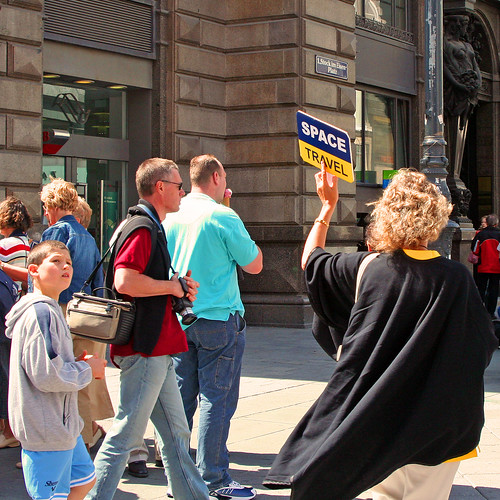Different cultures, the difference between cultural practices, the difference in the construction of cultures within different groups …however rational you are … it is actually very difficult, even impossible and counterproductive, to try to fit together different forms of culture and pretend that they can easily coexist. The assumption that at some level all forms of cultural diversity may be understood on the basis of a particular universal concept, whether it be ‘human being’, ‘class’ or ‘race’, can be both very dangerous and very limiting in trying to understand the ways in which cultural practices construct their own systems of meaning and social organisation.
(Bhabha in Rutherford, 1990, p.209)
But in fact Bhabha is talking about the process of hybridity, or third space. He is talking about the coming together of different cultures then finding a need to negotiate, to come up with newer ways of being together. JC (Fab student) also found this:
the negotiation of cultural identity involves the continual interface and exchange of cultural performances that in turn produce a mutual and mutable recognition (or representation) of cultural difference.
(Graves, 1998)
It is about being flexible, able to change over time... obviously you don't want me to go on and on and on about this... but the theory is great I think for describing some online spaces. (Bhabha is talking about colonialism). Some spaces manage to bring people together who have shared interests, a fascination over the same things, like Flickr; ebay; illness support sites; cooking blogs . (Obviously this view derives from Gee.) In interacting over content brought to the space, I think that what happens is firstly a 'show and tell' phase, but then as the affiliations mature, there is a sense of exchange, of development of a specific culture in that space. I would not say that it would transform affiliates' lives; what I would say is that in that space negotiations occur.
Phew.
Got that off my chest then.



5 comments:
Obviously the MA student has had a thoughtful sage guiding her through the process. Bit hard reading for a Thursday evening, but you go girls!
And according to my Phd
'A Passion to exist: Cultural Entreprenuship and the search for authenticity in Cornwall'
I believe that within those 'spaces' the negotiations are mediated by the cultural entrprenuers, because someone has to do all that cultural work, in my case I look at Cornish identity
You'll have to get it now its a gripping read and I haven't had a penny in royalties from the British Library yet!
To expand on my hastily written advert above, just before I went to bed!
Many people write about identites and culture as if they are given or somehow sui generis, in that all they have to do is be found, so for example people like Hobsbawm and Ranger talk about inventing tradition but what they forget to write about is who does the inventing? So even virtual identities are not just out there waiting to be found or invented, some one or some group of people have to entreprenurally work to activily create, re-create or invent said identity and then the culture of the group. They have to either discover or invent or create the explicit or implicit markers which define the 'rules' of that identity of culture.
That we can see this happening in Cornwall has become more and more evident over the last 10 years and this study of Cornwall and Cornish identity allows us in many ways to understand the genesis of other identities and cultures.
So the key question for me and it is a question raised in the two quotes above in your blog is who is it that does this work and why do they do it? Basically whats in it for them when they do the 'show and tell' for the first time? And then how is that developed as you suggest into negotiations and the development into something more, thats when the enterenurial work starts and these people become 'cultural entreprenuers'...
Blog serendipity brought me to your blog (I was posting bitchy comments about banks hijacking my money during interbank transfers – Natwest and LloydsTSB – to name names). But this post really got to me.
I have been working on the Relationship Management school of Public relations practice and have taken it to the granular level of relationships and organisations. The idea of culture in the model I have constructed is not necessarily singular. It depends on what I have called the social frame (time, place, knowledge available and interactive capability). Its form, in this model is not monolithic but construes in convergent tokens and values held by people in the frame they exist in. Thus class, race, gender, locale, social mores are much more fluid than most models would have us believe. As the song goes 'little boxes, little boxes' – and some of them are full of ticky tacky.
Yeah I know what you mean Bex - but hey look at these Guys go on the old third space stuff.
I think that is really interesting what DrRob says about the need for entrepreneurs. Maybe I would use the term cultural pioneer ... is that the same thing? Yes I think you do need champions; they are the movers and shaker on the net and in cornwall I presume they would be the politically motivated or social conscience people. I think that is often the motivation for such people - a desire to galvanise change. For some groups the motivation is clear - to offer support for illness etc. And some groups are initially about one thing but then change later; I think that sometimes people gather over one thing and then themes might emerge as the people interact. On the Flickr site, which was just set up to make a profit, users gradually found they could use it for cultural exchanges, if you like. Beginning with sharing pictures, but then gradually the sharing became a collaborative enterprise to an extent. (I love Flickr.)
That sounds really interesting that whole thing about a particulat frame - I wonder if this is something that fits with Lemske's work on liminal spaces and time... I have not read Lemske but know a bit about his work and I think you would be interested. So where can we read your theory in full?
Anyway, thanks everyone for responding to my outburst .
Post a Comment